I have gotten countless messages and emails over the years about moving to Morocco. While we initially had planned to be here just one here, that has since become a more permanent situation. This is our 6th year in Morocco and it looks like we’re here to stay.
In the spirit of sharing the information I have shared privately over the years I’ve put together this post to answer some of the most common questions I’m asked. Some of this information may be Morocco specific but in general it works no matter where you’re going.
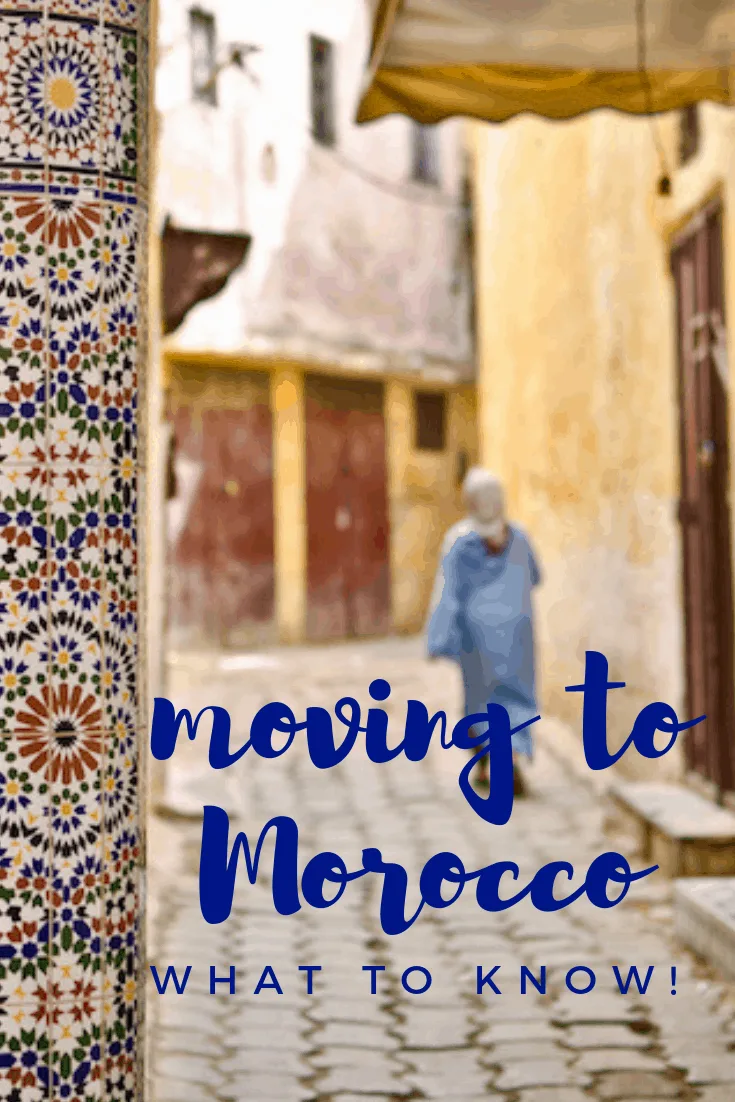
Table of Contents
What are the most important steps to take when thinking of and moving overseas?
The first step is actually making the decision to move overseas. For some people this is easy; they’re moving because of a job or opportunity. But, for others, it’s simply an interest in making a move. I have heard time and time again from people who are thinking about moving but are waffling and stuck in that space.
If you aren’t able to make a decision and set a timeline then you’ll never make the move. Be realistic and give yourself time but do set a deadline. I’m also linking to a post on how to relocate to a new country that is really helpful –> A Practical Guide on How to Relocate to A New Country
If you’re moving because you simply want to try something different for a little while (and it’s not a work based move) I suggest making it a temporary move like we did. That way you have an “out” if things don’t go as planned and you set yourself up from the beginning to be prepared for that possibility.
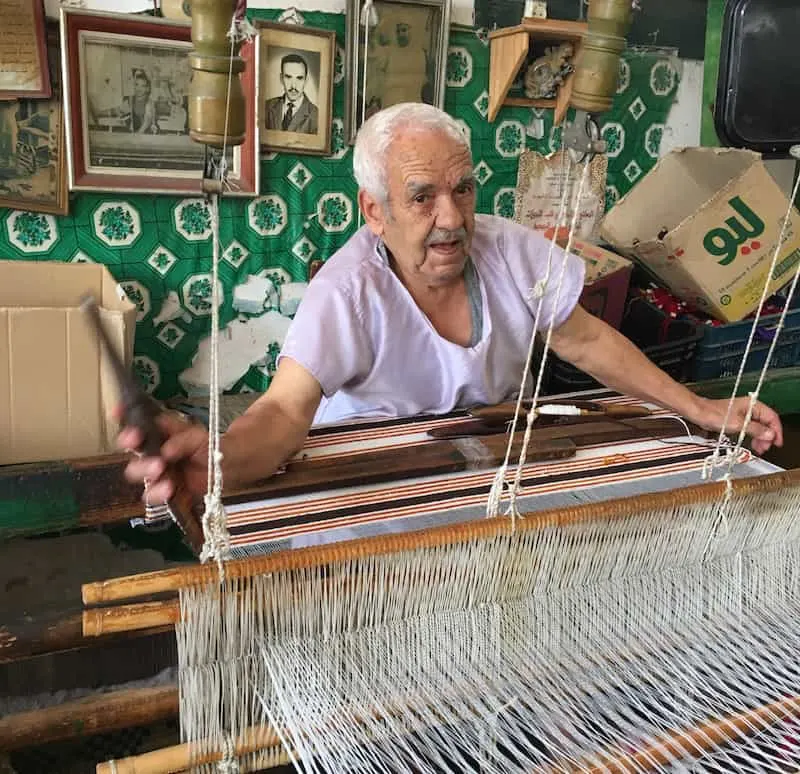
How do I get a job in Morocco or my new country?
In my case finding a traditional job wasn’t in the cards. You really need to consider where you’ll be relocating to and what the opportunities might be. If there are limited options for traditional employment it’s time to start thinking creatively.
In today’s global, connected world it’s possible to have a career and build your own financial path online. Consider what your work history is, what skills you have and what possibilities exist. If you can begin testing this before you leave your home country so that you have an understanding of what’s required.
If you do decide to look for traditional employment get connected with local expats as soon as possible. People who are on the ground already have a better pulse for what’s available and where to start looking. Ideally having some sort of employment in place before you move is the best option.
It’s also important to consider the job climate you’re moving to. While you might dream of living and working in Morocco do you have the skills needed to do so? For example, most traditional jobs here require Arabic, French and often English language skills.
You also need to get the proper paperwork to work legally. It may also mean you take a large pay cut. For example the minimum wage in Morocco is considerably less than in the US and even as someone with skills it will be difficult to find positions that pay near the same rate you would get in your home country.
How do you deal with money in your new country?
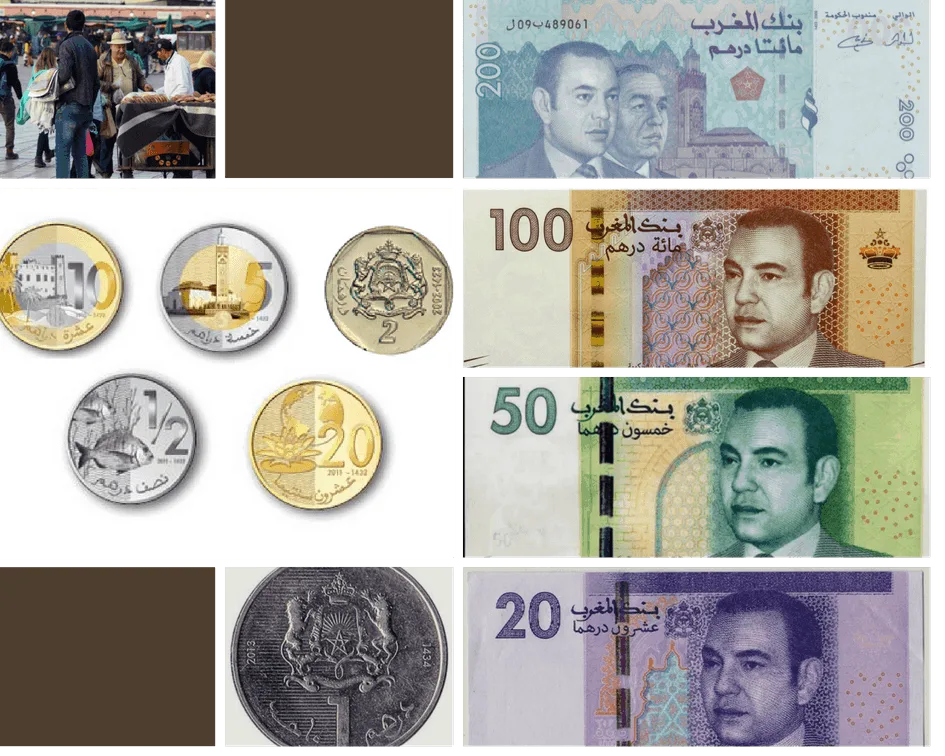
Usually this question refers to dealing with money when you have two different accounts. Let me explain.
I suggest keeping a bank account (or accounts) open in your home country when you move. Put someone on your accounts as your power of attorney. For example, my mom has a POA on my accounts so she can handle anything that needs to be done when I can’t be present.
We also have bank accounts in Morocco. Having both options available is really good as we like to keep our savings in the US as the currency is a bit more stable and there’s not the same regulations and taxation on withdrawing money.
Transferring money between the accounts can be difficult and we often use our ATM card to withdraw cash from our US account but there are limits on that too. If we need a larger sum of money using a service like Western Union let’s us receive a bigger sum without spending all day at the ATM and racking up multiple surcharges for withdrawals.
This is also where having someone that can act as a POA is very helpful. If I need my mom to take out a large sum of money to transfer she can very easily do this.
You may be wondering why I don’t just suggest sending a wire transfer. Depending on your bank this can get very expensive. Also depending on banking regulations between countries you may not be able to do this unless you’re transferring to/from a business account.
Investigating your banking options before you leave is a really important part of the process you shouldn’t neglect.
What do you do to prevent culture shock?
You don’t. Culture shock is going to be an inevitable part of your transition and it happens to most of us. It might not happen immediately; it might take months but eventually it will hit.
Surrounding yourself with people who can help you get through this phase is important. I also think it’s really important to allow yourself to feel the emotions that are connected to culture shock; anger, frustration, sadness, depression even. There is nothing wrong with you for feeling this way and by allowing yourself to feel these emotions you’ll be better able to work through them.
You can read my thoughts and experience going through this rough transition in this post;
Culture Shock, Depression, and the Not-So-Nice Side of Expat Life
What do you do about health insurance?
Depending on your country of origin you might have a very different outlook and experience with healthcare and health insurance. For Americans such as myself, it’s automatically assumed insurance is a must.
However, when we realized the cost of healthcare in Morocco was cheaper than our co-pays in the US and getting reimbursement for services was a headache, we chose not to get private health insurance and instead pay out of pocket.
If you have an employer or own a business you can look into applying for the CNSS system in Morocco. This is the general insurance system that is paid for and is an option for some people. Really research what options there are. You may only need coverage for catastrophic cases and not for minor day-to-day needs.
There are some companies that offer health insurance if you want to be covered. But also be aware they may not cover you outside of the country. We had looked into a few plans that would cover us everywhere in the world; but not in our home country of the US.
How do you learn the local language?
My best advice here is to start learning immediately. It will be overwhelming and a lot to take in but the sooner you start the better you’ll be. Many people jump into things and rely on using English to navigate life whether in Morocco or elsewhere.
In many countries, this is an option and you can survive however, until you learn the local language you’ll really miss out on a lot of opportunities to understand the local culture and make local friends. Enroll in a language class as soon as you arrive and stick to it. Use the bits and pieces you know and build on it as you go.
Most importantly don’t be afraid to try!
Need some Arabic resources? Start here –> Learning Arabic for Beginners; from your phone!
A Guide to Learning Arabic in Morocco
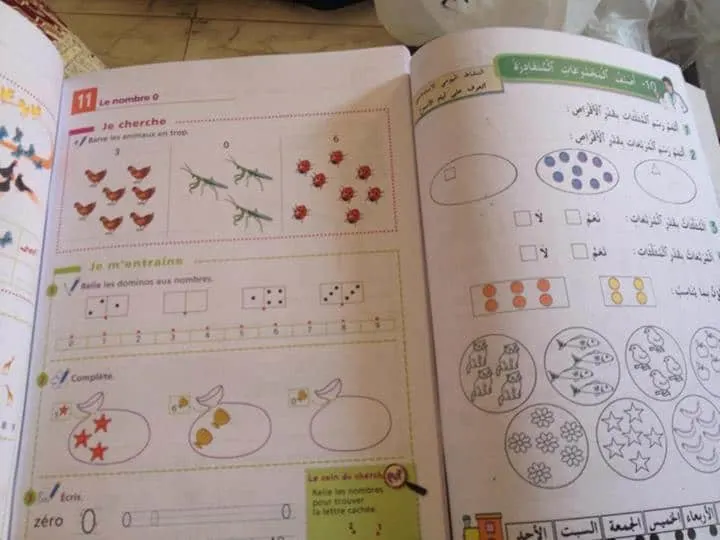
How do you find a school for your child/children?
Trial and error at least in our case. This will depend on where you’re going but schooling is an important thing for families moving overseas. My top tips are;
- Decide what your priorities are. Ours were that our kids would learn Arabic so it didn’t make sense for us to put them in an English speaking school.
- What is your budget? Schools in Morocco can range from $100 a month to $1000+ a month so you really need a grasp on what you can spend – especially if you have multiple children. Don’t forget they may also need to purchase uniforms and will need to buy all of their books and supplies.
- What options are actually available? While you may want your kids in an Arabic school not all schools will accept children who are entering without prior knowledge. We had a hard time finding somewhere that would take our son at 8 years old with no Arabic or French. A small, neighborhood school did accept them and started their journey until we could transfer them to a different school.
- How far do you want to travel? In Morocco many kids come home for lunch in the middle of the day; this means there’s a lot more transportation involved either by you or the kids in a bus. We really wanted our kids to go to a school that was on the other side of the city but couldn’t justify the long journeys multiple times a day – I would have literally spent all day driving.
If you really are set on a certain school you may want to live in an area close to that school. If you already have a place to live than you will want to start your search there.
(Note: please do not email me to ask the name of my children’s school. I do not provide this.)
What do you do when it comes to for transportation?
This answer will really vary depending on your personal situation. As a family with three children, it was vital that we had a car. However, if you’re a single person you may be able to use public transportation or taxis more easily. In Morocco, you can’t purchase a car unless you have a residency permit so you will need to take this into account.
Vehicles are also quite expensive in Morocco. Even used vehicles have a very high resale value and there aren’t a lot of automatic vehicles for sale (and you’ll pay more for them).
Also take into consideration where you live and the distances you’ll need to travel to reach the places you need to go. Some cities have fantastic public transport that will be easy to learn and navigate while others have paltry offerings.
Depending on your status in the country, how long you plan to stay and what’s available you’ll need to make the choice that is best for you.
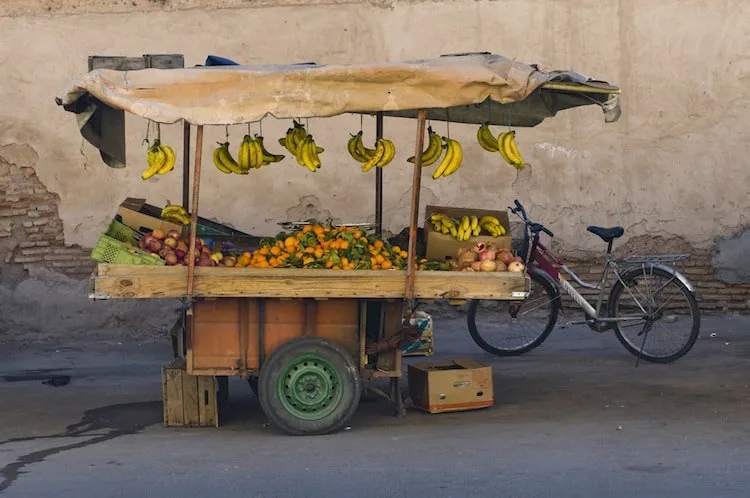
What are the best ways to find a place to live?
In Morocco, it’s really hard to find a place to live when you’re not in the country. Very few people use online listings and when you do find them they’re outdated or simply inaccurate. If you can, find a temporary housing option (something like AirBnb) for a month or so.
Then connect with local realtors (simsars) who can show you different options that are available. You’ll be able to get a better sense of your options, where things are located, and what it will be like to live there when you’re able to physically see it.
If you have any local contacts they also can be a huge help not only in finding housing but negotiating the price and dealing with the sometimes confusing paperwork.
Most importantly make sure that you have clear paperwork showing that you are either renting or have purchased the property. Do not rely on a discounted word-of-mouth agreement.
How do you get to know the country’s food options?
Eat it!
I see a lot of ex-pats who go out of their way to avoid local foods or are scared off by them. But if you want to get a sense of what’s available, you really need to make an effort to try it. If you can make a local friend or have a local colleague ask them to show you.
In many cases, you might even be able to find a guide who can take you to the market and show you how local people shop. This can be invaluable for not only getting you comfortable but saving you money!
In Morocco, most people don’t shop in grocery stores; though they are available and often it can be more comfortable when you’re new to shopping in them. Instead, local people use the local markets that sell fruit, vegetables, breads, and meats to do their day-to-day shopping. Food is purchased daily or every other day and not in bulk.
One other bit of advice is to learn how to make some of your favorite things from scratch (if you don’t already know). You will be able to find almost all basic ingredients no matter where you go so that you can make some of your favorite things. I’ll never forget the day I realized I could make my own enchilada sauce!
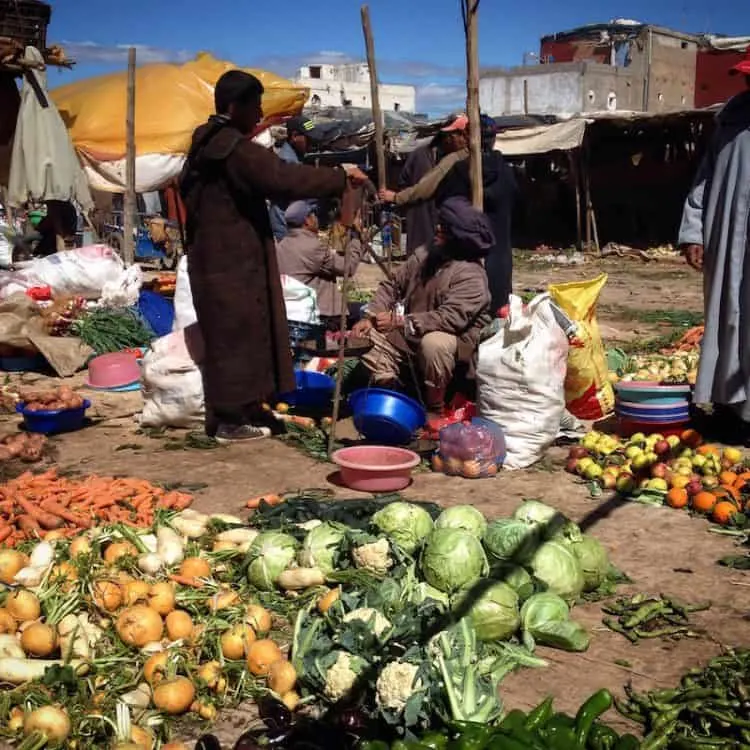
What tips do you have for feeling at home while abroad?
A few of the things that really helped us were bringing some items from home that would make us feel connected. For example, I have a favorite quilt that made the trip to Morocco with us as well as my favorite cooking pot.
While some people would say they simply are taking up space, these items have been important to making our transition a little easier. If you have children I highly recommend doing the same for them.
Another tip is to set your home up in a way that you’re used to. In Morocco kitchens often have closed cabinets that are really basic. Instead, I had a carpenter build tall, American-style cabinets with large, clear glass fronts. This might seem like a trivial thing but it helped make the space we were living in feel more like it was mine.
Even in places that may be temporary doing small things that make it feel not just like a space you’re living in but a home will help you! Need more ideas? Read my post on Tips for Decorating Your Expat Home to get extra inspiration.
What do you appreciate the most about moving abroad?
Moving overseas has given me a completely different worldview. I have a lot more empathy and compassion for people who make the decision to live in a country other than the one they were born in. A LOT more compassion!
It also has allowed me to feel like I have made a major accomplishment. Moving to a new country where you don’t speak the language and you learn how to navigate and build a life IS hard! But, once you do it you’ll be rewarded with the experience and knowledge that comes with doing it, even if it’s for a short time.
Laila
Saturday 22nd of June 2024
Hello As a us citizen with residency in Morocco and having income in the us, are you supposed to pay taxes in Morocco? What about the issue of double taxation? Thank you
Amanda Mouttaki
Sunday 23rd of June 2024
Morocco and the US do not have a tax treaty (so far as we've been told) that avoids double taxation. In most cases in Morocco you pay income tax on business income but not on personal income - again this may not be the case for everyone. So we pay US income tax + Morocco business tax but yes we are in the situation of double taxation.
Louise Greene
Monday 11th of December 2023
Hi, your website is really interesting. Thank you. I wondered, if you are moving to Morocco but do actually want to use an international school because it is better for your family at this point in time, what can you recommend? Are there any bilingual French/Arabic schools with a good reputation? (My children have some French)Or any Trilingual schools in Casablanca or Rabat that also offer some English?
Amanda Mouttaki
Tuesday 30th of January 2024
It's hard to say a specific school because I find they all really vary depending on the kids and family. There are not that many international schools to choose from so my best advice would be to visit them each and get a feel for them and then decide.
Cheryl
Tuesday 6th of December 2022
Hi - I am an American moving to Morocco, with so many questions I don't even know where to begin. I was wondering if you have found other Americans in Morocco who have been able to provide you with practical information, such as an accountant to assist with filing moroccan/US taxes, an English-speaking doctor to assist in getting/filling prescriptions, etc. I have found it very difficult to get answer to my many questions on-line as there is so little information available. At this point am resolved to moving without answers and then trying to deal with thing once in Morocco. Thank you so much for putting together this page.
Cheryl
Thursday 8th of December 2022
@Amanda Mouttaki, thank you
Amanda Mouttaki
Thursday 8th of December 2022
A lot of these things are going to depend on the city you live in and your exact needs. Some is trial and error. For taxes, you really need to be looking for someone in the us to handle your filing as you won't be filing income taxes in Morocco. Because so much is variable you will probably not be able to have solid answers until you get settled.
Katie O’Brien
Sunday 23rd of October 2022
Hi Amanda! From what I Understand, I have to start the carte de séjour process after arrival in Morocco? I am worried that if it takes longer than the 90 days that I can stay, I will obviously have to leave and come back. My boyfriend lives in Marrakech and I am thinking of coming back and living with him there.
Katie O’Brien
Thursday 27th of October 2022
@Amanda Mouttaki, Thank you so much😊
Amanda Mouttaki
Tuesday 25th of October 2022
Yes you can not start the process until you are in Morocco. Once you submit the paperwork, they will give you a paper receipt that acts as a temporary residency card. So you really just need to get the paperwork in and accepted in that 90 days. If you don't, you can exit for a few days, return and submit.
J C
Tuesday 22nd of September 2020
Dear MarocMama, Thanks you for sharing all your insights and advice. I just arrived in Morocco and hope to look into a potential longer-term stay (we'll see how things go). I wanted to look at purchasing a food truck or a small café/"snack" space and so far, I've come up with nothing. I looked on Avito, marocannonces, and Trovit, but commercial rentals seem hard to come by. Do you know of a good way I can look into something like this? a website, a trustworthy real estate company, people you know (who might know people) ? I would appreciate your input so very much! Keep up the good work :)
Amanda Mouttaki
Saturday 26th of September 2020
Unfortunately not the easiest way but one of the best ways to find these things is really by networking and asking around. Commercial rental is a bit complicated here, I'd for sure speak with an accountant and/or realtor who can explain to you how the rental system works here. A realtor may actually be a good bet too for helping you find a space.